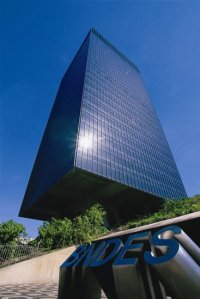Corruption goes Brazilian



Dime con quien BNDES y te dire quien eres…
Back in April, Juan Cristobal wrote about a big corruption investigation in Brazil. Uncovered by the magazine Época, the story involved local conglomerate Odebrecht, state development bank BNDES, and a large loan promised in 2009 by then President Lula Da Silva to the comandante presidente for the construction of Metro Los Teques.
Both Odebrecht and BNDES formally denied any wrongdoing one month later.
While JC’s post put the focus on Odebrecht’s questionable activities in Venezuela, I would like to refer to the other main part involved: The National Development Bank of Brazil, run by Brazil’s government, and known publicly as BNDES.
Last week, a group of South American journalists presented a special reportage about BNDES’ activities in several countries, including possible acts of corruption like bribes and overpricing. Titled as “The invisible hand of BNDES”, the project is coordinated through the new investigative site BRIO, co-founded by Brazilian journalist Fernando Mello.
The team of 17 people had access to official documents, thanks to Brazil’s version of the Freedom of Information Act (Lei de Acesso à Informação). The investigation covers BNDES’ massive spending (which grew 1,000% in a decade), focusing on five specific cases: the purchase of commercial planes in Argentina, brand new highways in Bolivia and Peru or the construction of a new hydroelectrical plant in Ecuador. All those involving Brazilian companies one way or another.
In our case, it has to do with Line 5 of Caracas Metro, which started construction in 2007 (one year later than planned) and its first station is supposed to be ready later this year. The project also involves the omnipresent Odebrecht. The Line 5 project has faced plenty of delays, changes and cost overruns, as the title of the article (“A delayed subway and three times more expensive”) clearly implies. In eight years of works so far, less than half of the project (47%) is done.
What is BNDES’ role in this? The bank paid a small part of the bill, but tried to keep the info hidden from the public. Our own economic development bank BANDES (with an extra “A”) is involved as well. As in B(A)NDES delictivas …
BNDES money now finances 5.4% of the Line 5 venture, after it had its cost increased by 218% (currently, the Brazilian bank contributes $219m of the $3.9bn total).
The BNDES, despite BRIO’s efforts, kept the amount of money for Line 5 and for specific projects in Latin America secret … Compared to Venezuelan official data, the figures released differed by almost $150m for the specific case of Line 5. The BNDES later updated the information on their site.
Figures released by the Venezuelan government differ from the values now made public by BNDES.”
When BRIO tried to question government sources to find out what’s behind the delays, they only found silence.
The entire article (written by El Nacional’s former investigation-unit head David Gonzalez) is long yet satisfying, but full of details and personal testimonies. The whole line 5 of the Metro is a hot mess, but it’s just a sample of the many troubles that the Caracas subway had faced for years now. And that isn’t the only subway system in Venezuela facing both delays and cost overruns.
The article also highlights the special relationship between the central government and our Southern neighbors:
In Venezuela, Brazilian construction companies are among the main beneficiaries of public contracts. This is largely due to agreements made between Chávez and his then colleague Luiz Inácio Lula da Silva, Brazil’s president between 2003 and 2010. The increase in investments caught the attention of public servants at Itamaraty, Brazil’s Ministry of Foreign Relations.
Data obtained by the Commercial Sector of the Brazilian embassy in Caracas show that 2007 was the first year of Chávez’s presidency in which Brazil’s main companies invested heavily in Venezuela, with investments made in previous years considered “marginal”. Today, they manage more than $23bn in public contracts.”
It’s no secret that Lula was a very close ally of the late comandante supremo. And he still likes to remain in touch.
You can read the entire series of reports here. They’re well worth the time, but you need to register first to read them. They’re all available in three languages: English, Portuguese and Spanish. And for the time being, they’re fully free.
Caracas Chronicles is 100% reader-supported.
We’ve been able to hang on for 22 years in one of the craziest media landscapes in the world. We’ve seen different media outlets in Venezuela (and abroad) closing shop, something we’re looking to avoid at all costs. Your collaboration goes a long way in helping us weather the storm.
Donate




